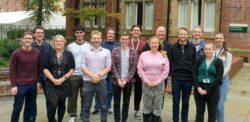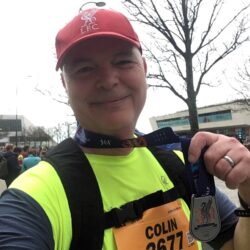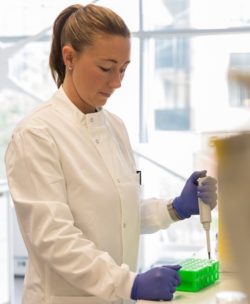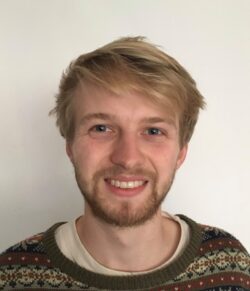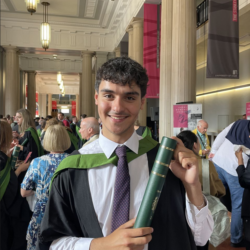People
Prof. Colin Fishwick
Colin Fishwick received his undergraduate degree in chemistry from the University of Liverpool, graduating with First Class Honours in 1982. He went on to carry out his PhD there from 1982-1985 before joining the staff at University of Leeds in 1985. He was appointed to a Chair in Medicinal Chemistry in 2009. He is currently Professor of Medicinal Chemistry at the University of Leeds and Honorary Visiting Professor of Medicinal Chemistry at the University of Bradford, Institute of Cancer Therapeutics and at the University of Sheffield. He has authored more than 100 publications. In 2018 he took up the post of Head of School in the School of Chemistry at Leeds.
Read more >
Dr. Martin McPhillie
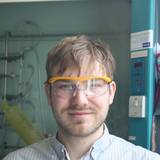
Martin is a Lecturer in the School of Chemistry with a focus on Medicinal Chemistry and the University Curriculum Redefined project. He became interested in computer-aided drug discovery & medicinal chemistry during his MChem/PhD (Leeds) and applied this training to several short postdoc positions in the area of infectious diseases (malaria, toxoplasmosis & ebola). His chemistry training has taken him into industry (Avecia Pharmaceuticals UK), America (University of Notre Dame) and back to Yorkshire (Universities of Sheffield & Leeds). In September 2017 he started teaching within the School of Chemistry at Leeds building his skills and expertise to secure a Lectureship in 2022. He teaches and supervises across the BSc, MChem & MSc Chemistry programmes and co-supervisors PhD students in the area of Medicinal Chemistry.
Collaborators
Dr. Katie Simmons
I took a place at Newcastle University to study for a Master’s degree in Chemistry with Medicinal Chemistry in 2001. As part of my MChem there, I was lucky to work in the Northern Institute for Cancer Research, synthesising small molecules as potential anti-cancer agents. This piqued my interest in drug discovery, and I applied for a PhD in Leeds in the same field. In 2005, I started my PhD in Chemistry, looking to design and synthesise new small molecule antibacterial agents. It was during my PhD that I first learnt about ligand design, virtual high-throughput screening and molecular modelling, which I enjoyed as much, if not more, than synthesising the designed molecules- it was good to have a balance of different research angles if one thing wasn’t going well you could still feel a sense of achievement with other parts.
I completed my PhD in 2008 and stayed in the same research group after being offered the chance to work on a ground-breaking EU-funded collaboration with researchers from all over Europe. The aim of this project was to identify small molecule inhibitors of a number of different membrane proteins, ion channels and transporters. During this research, I began to learn the basics of compound screening, fuelling a new interest in biology - a subject I only had a GCSE in, so a lot to learn! My eldest daughter was born in 2012, and I took a period of maternity leave - returning to work part-time in May 2013 on a project to identify small molecule antimalarial agents- these finally made it to pre-clinical development, in partnership with the Medicines for Malaria Venture.
In 2014 I was offered a chance to move departments from the School of Chemistry to the Leeds Institute of Cardiovascular and Metabolic Medicine to work on a project that would not only utilise my chemistry background, but also allow me to learn a number of new techniques including cell-based assays and electron microscopy. I worked here for 8 years (including another career break) before moving to FBS as a lecturer last year where I am developing my group to have a focus on modulators of protein-protein interactions and membrane proteins.
Research Fellows
Dr. Keith Livingstone
Originally from Glasgow, Keith completed his undergraduate studies in chemistry with drug discovery at the University of Strathclyde in 2016, including spending a year as an industrial placement student at GSK Medicines Research Centre in Stevenage. Returning to Strathclyde, he obtained his PhD in 2020 under the supervision of Dr. Craig Jamieson, with research focussing on 1,3-dipole chemistry, boron chemistry, photochemistry, and chemical biology. Later that year, Keith joined the group of Prof. Dr. Ryan Gilmour at the WWU Münster, Germany, researching the development of fluorination methods mediated by hypervalent iodine organocatalysis. He joined the department in Leeds in 2022, where he works as a teaching/research fellow within the Fishwick/McPhillie group, with specific interests in antibacterials, PROTACs, and photochemical tools for biology. Outside the lab, Keith enjoys a variety of sports and can often be found running along the Leeds-Liverpool canal or making a fool of himself on a squash court.
Dr. Scott Grossman
Scott completed his undergraduate degree in chemistry at the University of York, having completed his final year studying abroad at the University of Sydney, focussing on medicinal chemistry. From here, he undertook a Masters’ degree on Antimicrobials and Antimicrobial Resistance shared between the Universities of Nottingham and Birmingham, combining microbiology and chemistry. Scott obtained his PhD from the School of Pharmacy at the University of Nottingham, where his work focussed on quorum sensing communication systems in Pseudomonas aeruginosa, combining medicinal chemistry with biological sciences. Infectious disease remains a key focus for Scott, with his role as a postdoctoral researcher at the University of Leeds looking into novel antibacterial topoisomerase inhibitors as a method of combatting antimicrobial resistance. In his spare time, Scott loves to travel, and takes every chance he can to SCUBA dive. He is a major contributor to the lab’s postcard wall.
Dr. Charlotte Revill
Charlotte obtained her undergraduate degree (MChem Chemistry with Medicinal Chemistry) in 2007 from Newcastle University and her PhD (targeting both mTOR and p52/MDM2 for anti-cancer purposes) at the NICR at Newcastle University in 2011. From 2011-2012 Charlotte worked at the University of Dundee Drug Discovery Institute before moving to the University of Leeds. She has previously worked with Dr Richard Foster on a number of cardiovascular targets before joining the Fishwick group in 2023. Her current focus of work is developing therapeutics to increase insulin sensitivity.
PhD researchers
Sam Turvey
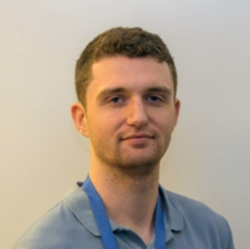
Sam’s PhD project began in October 2019, utilising a combination of electron microscopy and structure-based drug design to discover small-molecule modulators of Insulin/Insulin-like growth factor hybrid receptors. The project aims to use these compounds to elucidate the biological role of the hybrid receptors, which may inform novel treatments for type 2 diabetes and the associated cardiovascular complications.
Sandra Milik
Sandra started her PhD in October 2019 working on a project entitled 'Broadening the Spectrum of Antibacterial Drugs to Tackle Multidrug Resistant Gram-negative Pathogens' in collaboration with Prof. Alexander O'Neill at the School of Molecular and Cellular Biology, University of Leeds. The project aims to optimize anti-Gram-positive antibiotics so as to improve their anti-Gram-negative activity as an approach to develop new anti-Gram-negative antibacterial agents. Her project is funded through the PhD programme provided by the Newton-Mosharafa Fund. Sandra obtained her MSc in Pharmaceutical Chemistry at Ain Shams University, Egypt, working on the design and synthesis of EGFR/HER2 inhibitors as anticancer agents. She currently holds a position of lecturer assistant at the Faculty of Pharmacy, Ain Shams University.
Sam Meredith
Sam began his PhD project in September 2019; the project has the working title ‘Connecting the solid state, bioavailability and formulation strategies with the Drug-Development pipeline’. Through the use of a combination of novel and established methods for assessing the solid-state structure of drug crystals, we aim to develop a computational strategy which allows for prediction of mechanical, morphological, surface and bioavailability properties of a drug molecule in order to help guide the logical construction of formulation strategies. This will be achieved by statistical analysis of intermolecular ‘synthons’ which build up the bulk and surface of our drug crystal lattice.
Aidan Johnson
Aidan started his project in October 2020, supervised by Robin Bon in LICAMM and Andy Wilson in Chemistry. Martin McPhillie has recently started co-supervision. His BBSRC funded project 'Controlling and Measuring TPRC1/4/5 channels with chemical probes' involves synthetic chemistry, photophysical evaluation of probes, and biological testing of synthesised molecules. TRPC1/4/5 channels are mammalian sensory receptors, implicated in cardiovascular disease and anxiety. Aidan completed his MSci degree at the University of Glasgow, with a year spent in Nathaniel Martin's antibiotics lab in Utrecht (NL). His final year project aimed to develop PROTACs for a specific p53 mutant. Outside of the lab, Aidan plays fiddle and viola, and tries to run more.
Dan Gugan
Dan joined the group in 2021, working on his PhD ‘Exploring RGD-integrin mimics as a novel therapeutic approach in diabetes’. The project is aiming to develop novel agonistic treatments for cardiovascular disease and type 2 diabetes. He completed a MChem undergraduate degree at the University of York, including a year in industry at LifeArc in Stevenage. Outside of work, Dan is a keen climber and listens to music that isn’t sociable to play in the lab.
Harry Tran
Harry started his PhD project in October 2022, entitled ‘Probing a novel allosteric binding site in Mycobacterium Tuberculosis DNA gyrase to tackle TB and antimicrobial resistance’. His work is funded by the White Rose Mechanistic Biology DTP BBSRC and is focused on investigating an allosteric site in M.tb DNA Gyrase, previously discovered in Staphylococcus aureus DNA gyrase. His project will focus on utilising computational methods to aide in the design of potent new inhibitors of M.tb. This work is in effort to address the rise in antibiotic resistance, in particular against the fluoroquinolones, a family of major antibiotics that treat bacterial infections via the inhibition of DNA gyrase. Harry completed both his BSc and MChem in Medicinal Chemistry at the University of Leeds during which he spent a year in industry working as part of GSK’s MedChem department.
Alex Derry

Alex started his PhD in 2022 working on the “Identification and Elaboration of Fluorine-containing Inhibitors of PYK2 and eNOS: a Novel Target to Increase Nitric Oxide Bioavailability in Insulin-Resistance”. This combines aspects of fragment-based drug discovery, NMR screening, synthetic medicinal chemistry, and analysis of large data sets for library design. The aim is to generate a fluorine fragment library, with the assistance of DataWarrior. Fragments shown to bind to eNOS using NMR will be validated using biorthogonal techniques before growing the fragments in a structure-guided manner. His work is funded through MRC DiMeN doctoral training partnership and an industrial collaborator, Liverpool ChiroChem.
Emma Barclay
Emma started her PhD in October 2022 working on the development of small molecule inhibitors of mitochondria metabolism for the treatment of glioblastoma. She is supervised by Dr Robin Bon, Dr Martin McPhillie, Prof Andrew Wilson and Dr Heiko Wurdak. This project aims to investigate the interaction of the small molecule inhibitor KHS101 with its target protein, HSPD1, and also to develop inhibitors with increased potency and metabolic stability using a combination of chemical biology and medicinal chemistry.
Chris Boyall
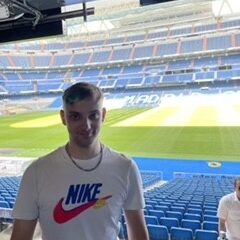
Chris completed his MChem at Sheffield Hallam University, conducting his 3rd year and 4th year research projects in Dr Sarah Haywood-Small's mesothelioma group, focussing on the synthesis and quantum yields of porphyrinoid photosensitizers under Dr Simon Turega. He joined the University of Leeds in October 2023, and is developing small molecule potassium channel inhibitors to remediate types of epilepsy. Supervised by Dr Katie Simmons, Dr Martin McPhillie and Dr Jonathan Lippiat, Chris will be synthesising molecules to treat KCNT1-related epilepsy, using cell-based assays to determine their efficacy in vitro. Chris outside of work enjoys playing football, badminton, and watching a Jurgen Klopp masterclass.
Matty Dawson
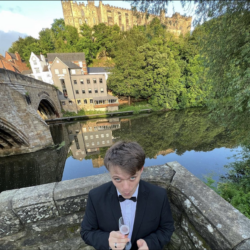
Matty completed his undergraduate in chemistry at the University of Leeds back in 2021. From there, Matty studied his MSc in Drug Chemistry in his home city at the University of Newcastle, with his research focusing on multi-modality probes for the clinical imaging of disease under Dr Lee Higham. After expressing an interest in teaching, Matty completed his PGCE qualification at the University of Durham before joining the group in October 2023. His project aims to Broaden the spectrum of antibacterial drugs to tackle multi-drug resistant gram-negative pathogens, under the supervision of Colin Fishwick, Martin McPhillie and Alex O’Neill in the faculty of biological sciences. Outside of the lab, Matty is a trampolinist and competes in competitions with the university across the UK. If Matty can’t be found in the lab or the trampoline, he will be found relaxing with friends and family, most likely binge watching anything Sci-fi!
Masters Students
Filip Jinga
Filip completed his BSc in Medicinal Chemistry at the University of Leeds in 2023, with a final year project focusing on fluorine fragments and 19F NMR. He is now working on an MRes project under the supervision of Dr Keith Livingstone and Dr Martin McPhillie, using computer-assisted drug design to design novel PROTAC linkers. Outside of the lab, Filip has a keen interest in a variety of sports and outdoor activities, as well as an interest in DJing and all things dance music related. He also loves exploring new cultures, learning about their languages, way of life and (especially) their food.
Kylan Hope
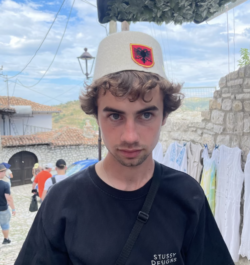
Ky started his Masters in October 2023, having completed 3 years of Medicinal chemistry at Leeds. His 3rd year final project was creating a library of human and plasmodial dihydroorotate dehydrogenase enzyme inhibitors. Now working on tetrazole photochemistry and incorporating it into chemical biology, under the supervision of Keith Livingstone. Away from chemistry he loves to travel and is hoping to overtake Scott’s contributions to the postcard wall very soon. Alongside also enjoying making a fool of himself on the squash court.
Administrative Staff
Shelly Parker
Shelly started working in the School of Chemistry in 2009. She provides administrative support to Colin and his research group. Outside of work and being a mum, Shelly is a running club secretary and enjoys winter cross-country and trail running – particularly if it involves mud, hills and fancy dress! She is now lovingly known on the local cross-country scene as the ‘Christmas Tree’ after scooping the fancy dress prize.

